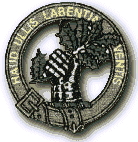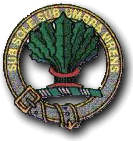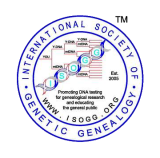Irwin DNA Project
From ISOGG Wiki
 | |
 Irvine of Drum Sub sole sub umbra virens Flourish in Sunshine and Shade | |
| Administrator | |
|---|---|
|
James M Irvine | |
|
| |
| Website | |
| http://www.clanirwin-dna.org | |
| Additional Project Information | |
| DNA type(s) used | Y-DNA |
| Founded | 2005 |
| Project size | 530+ |
| Surname variations | Arnwine, Ervin, Erwin, Irvin, Irvine, Irving, Irwin, Urwin |
| Geographic areas | Worldwide |
| Predominant haplogroup | R1b-L555 |
The Clan Irwin Surname DNA Study was established in November 2005. It seeks to explore how genetics can help genealogists researching surnames such as Arvin, Ervin, Erwin, Irvin, Irvine, Irving, Irwin and Urwin. We now have over 600 participants, including representatives of all the surviving traditional branches, and of some newly discovered branches! Over 120 have taken BigY tests.
Contents
The surname
Tradition recorded in the 17th century claims that the Irvines or Irvings of Eskdale and Bonshaw (in Dumfriesshire, in the Scottish Borders), Castle Irvine (in Co Fermanagh in Ulster), Drum and Marr (in Aberdeenshire), Mearns (Kincardineshire), Orkney and Perthshire were all descended from a single ancestor, who was also the progenitor of the kings of Scotland from 1034 to 1286. It is now clear that the these branhces of the surname are each unrelated to one another, and surname was probably first given to men who came from the town of Irvine in Ayrshire. Today over 100,000 males use the surname throughout the British Isles, in Australasia, and, predominantly, in North America.
The project
As surnames and Y-DNA descend through the male line, only Y-DNA tests of males using the surnames like Irwin are included (or other names with a very close match). Family Tree DNA is the preferred testing company. 37 marker tests are recommended, and participants are invited to submit their paternal pedigree. All spelling variants are accepted, as are participants using completely different surnames but sharing a close match with one of the project’s Irwin DNA signatures.
Goals of the project
- To facilitate and co-ordinate Y-DNA tests for males bearing the surname;
- To combine these test results with genealogical data;
- To identify distinctive genetic families and their origins;
- To promote and promulgate analysis, research and discussion.
How to join the project and to interpret Y-DNA test results
See www.clanirwin-dna.org < Joining the Study
The Study's main findings
1. The success of this project is manifest by its steady growth over fifteen years to over 500 participants, so that it is now about the 50th largest of some 10,000 surname DNA projects world-wide. Over 80% of the participants are Americans whose genealogies do not reach back "across the pond", but whose involvement has enabled them to identify the geographic origin of their paternal ancestors. Over 90% of the participants have been divided into distinctive genetic families, and the regional origins of most of these families determined. Sub-groupings have also been identified. 96% of participants have opted to share their results in public.
2. 90% of the project's participants reside in the New World (compared with 82% of the individuals who today use the surname or spelling variants thereof). However senior representatives of all the main Scottish and Irish branches are included. Over 50% of the participants can trace their paternal ancestry to before 1800, but only 6% to before 1600.
3. Some local spellings of the surname remain dominant within Great Britain (Irving in the Scottish Borders, Irvine elsewhere in Scotland, Urwin in Northumberland and Durham, Irwin elsewhere in England). However the spelling of the surname today, especially in Ireland and in the New World, has been shown to be a most unreliable indicator of the geographic origin of paternal ancestry.
4. Over 90% of the participants have tested to 37 markers or more. Testing to other resolutions has generally been found to be less cost effective, and at present upgrading to 67 or 111 markers is only recommended after prior consultation with the Study Administrator.
5. To qualify for membership of one of the project’s genetic families (or sub-groups thereof), comparison of the participant’s DNA signature with the modal haplotype of the project using FTDNA’s 24-generation, no paper-trail TiP must exceed a probability of 80%.
6. Over 40 distinct genetic families have been identified on this basis, all using spelling variants of the surname but none related to one another during the surname era.
7. The geographic origins of most of these families have been identified from genealogical data. Most have Scottish origins.
8. Nearly two thirds of all the project's participants are members of a single genetic family, apparently sharing a common ancestor who probably lived in Dumfriesshire in the 14th century. This "Borders" family includes participants representing the Irvines of Eskdale, the Irvings of Bonshaw and Dumfries (all in Dumfriesshire), the Urwins of Co. Durham, and the Irvines of Castle Irvine (Co. Fermanagh). Some of these participants still live in Dumfriesshire, some are descended from ancestors who migrated direct from there to USA, but the majority now living in USA are descended from ancestors who probably migrated from the Borders to Ulster in the 17th century, and from Ireland to Colonial America in the 18th century. This proportion of participants sharing a single common ancestor is higher than found in most other Scottish clan surname DNA projects. This genetic family, with over 330 members, is thought to be the largest such family in any surname DNA project.
9. In 2011 over 70% of the members of this Borders genetic family were tentatively divided into 14 sub-groups, each with a distinctive DNA-STR signature. Some of these sub-groups can be assigned a local geographic origin, and some an approximate age. The sub-groups were identified with the help of cladograms (both phylogenetic trees and network diagrams), but the subsequent development of SNP testing has shown these STR-based sub-groupings to be largely unreliable.
10. A curious feature of the largest of the former sub-groups was that over 30 participants have identical DNA signatures to 37 markers (of which 12 have identical signatures to 67 markers), and yet no genealogical relationship between any of them can be identified. This is now attributed to convergence, and to be one reason why using STR data to determine sub-groups is unreliable.
11. Conversely another sub-group has two brothers with a genetic distance of 2 in 25 markers, illustrating the dangers of relying on the STR data of a single participant to represent the DNA signature of a genealogically related family. This is a further example of the very random nature of STR mutations
12. The advent of SNP testing has enabled the development of an extensive R1b L555 haplotree to be built on the results of about 50 L555 BigY test results and a further 70 L555 SNP Pack test results, producing up to 6 biforcations below L555 and identifying about 60 distinct lineages. It emerges that despite the limitations of STR data, 37 marker STR test results are a reliable indicator of the L555 SNP, and although L555 is not quite unique to the Border Irwins, it is almost certainly post AD1000.
13. Triangulation has enabled some L555 DNA lineages to be merged with the conventional pedigree of the Bonshaw Irvings, enabling some post-AD1500 SNP mutations to be dated. This merging of a haplotree with a conventional is perhaps the holy grail of genetic genealogy, and has been achieved by very few other DNA surname projects, Nearly 60% of the 330 L555 project participants can now be placed on this L555 haplotree.
14. All of the remaining genetic families are small: the largest has only ten participants.
15. Nearly 20 of these small genetic families, all of whose members now use the surname Irwin (or spelling variants), share the DNA signatures of other Border surnames, suggesting non-paternity events ("“NPEs") such as a young boy taking the name of his Irving stepfather, probably before the 17th century when many of the Border Irvings migrated to Ulster.
16. A further seven of the small genetic families have origins elsewhere in Scotland: one from Drum in Aberdeenshire, one from Perthshire, one from Forfarshire, two from Orkney, and two from Shetland. None of these families is genetically related to each other or to the Borders family, and the lack of close matches with any other surname suggests most are not NPEs.
17. The specific finding that the DNA signatures of the families of Bonshaw and Drum differ appreciably does not unequivocally disprove the tradition that these two lines were once somehow related.
18. None of the participants share the DNA signatures of the Carlyle, Dunbar, Hume or Robertson families whose traditions, like that of the Irvings, claim descent from Crinan, the grandfather of King Duncan I and paternal ancestor of most of the Kings of Scotland down to Alexander III .
19. The origins of several further small genetic families have not yet been undetermined; all are probably Scottish; some may be NPEs.
20. These findings are suggesting that even within Scotland the surname has plural origins. This challenges the tradition that all Scots bearing the surname had a single ancestor.
21. Five of the small genetic families appear to have non-Scottish origins: three use anglicised versions of gaelic surnames that originated in southern Ireland, one appears to be descended from the Dutch or German surname Arnwin, and another is an Afro-American family, formerly slaves, who no doubt took their name from their slave master.
22. 13% of the participants have clearly inherited the DNA signature of one of the Study’s genetic families but are no longer using the surname Irwin (or variant spelling). Many of this 13% have the DNA signature of the Irwin Borders family but are now using other Borders surnames. The ancestries of these participants clearly include NPEs. Probable locations and approximate dates have been identified for some of these events.
23. Only 9% of the participants cannot be unassigned to a genetic family, because either insufficient markers have been tested or they are singletons who cannot (yet) genetically related to another participant.
24. So far there has been only limited success in identifying genealogical relationships within the genetic families, but with only about 0.3% of the world's 100,000 adult males who today use the surname, however spelt, having undergone a Y-DNA test, this is hardly surprising. As the project continues to grow, and analysis methods improve, more relationships will be found.
25. Although the project has provided some surprises, it is recognized that genetic genealogy is still an evolving tool, its probabilistic nature prevents dogmatic conclusions, and that genetics alone cannot disprove long-established traditions. The project welcomes participants sharing our DNA but not our surname, and respects the diverse contributions of participants from every genetic family who share the surname, however spelt, to the Study, the CIA and the Clan and its heritage.
26. While much has already been learnt about the origins of our surname, participation by more individuals using the surname, especially those with long paternal pedigrees, will help improve our understanding of the genetic families and sub-groups already identified, and others yet to be "discovered", as will selective upgrading and SNP testing by existing participants.
27. The success of this project is attributed to the support (non-financial) and publicity given by the Clan Irwin Association of America, to the technical and financial support given by a number of dedicated individuals, to advice from other project administrators, to the regular publication of detailed analyses of test results, and to the good fortune of inheriting a surname with such interesting genealogical and genetic features.
Papers
"Towards improvements in y-DNA Surname Project Administration" by James M Irvine. Journal of Genetic Genealogy, Fall 2010. This paper is the first comparative study of DNA surname projects.
Books
- Dr Christopher Irvin and his 'Original of the Family of the Irvins' by James M Irvine, published 2018, available from Amazon £8.99 or US$13.99.
- The Genealogy of Washington Irving by James M Irvine, published 2019, available from Amazon £8.99 or US$13.99.
- The Irwin Surname: its Origins, Diaspora and Early Branches by James M Irvine, published 2020, available from Amazon £12.99 or US$18.99. A comprehensive update and expansion of previous published books on the surname, structured on DNA findings.
Lectures
- "Administering a large yDNA Surname Project", to the Guild of One-Name Studies DNA seminar, Cheltenham, 9 Feb. 2013;http://www.one-name.org/members/seminars/2013_Feb_DNA/Managing_A_Large_Study_James_Irvine.pdf]
- "Administering a large Scottish Surname DNA Project, to Who Do You Think You Are Live, Glasgow, 29 Aug. 2014;
- "A Scots-Irish Case Study - The Irwin Surname DNA Project" to "Genetic Genealogy Ireland, 2015" at the "Back to Your Past" event, Dublin, 10 Oct. 2015 (audio version can be found at https://youtu.be/YMcBkz79wQM);
- "Surname Projects - Some Fresh Ideas", to FTDNA's 11th International Conference on Genetic Genealogy, Houston, 15 Nov. 2015;
- "Lessons from a large yDNA Project", to Who Do You Think You Are Live, Birmingham, 8 April 2016 (audio version at https://www.youtube.com/watch?v=glsxj5LBzo4);
- "Advanced yDNA testing for Surname Projects", to the Guild of One-Name Studies DNA seminar, Cheltenham, 13 Aug. 2016.
- "Surname DNA Projects - A Holistic approach", to "Genetic Genealogy Ireland, 2017" at the "Back to Your Past" event, Dublin, 22 Oct. 2017.
- "Y-DNA of a Scots-Irish Diaspora", to "Genetic Genealogy Ireland 2018" at the "Back to Your Past" event, Belfast, 16 Feb. 2018 (audio version at https://youtu.be/vvRBkYM1wQE). This is a longer version of the actual lecture, as explained in the footnote to the first slide. This version is hopefully a useful learning tool that complements the content of much of this website.
- "Using Y-DNA in Practice", to "Genetic Genealogy Ireland 2019" at the "Back to Your Past" event, Belfast, 16 Feb. 2019 (audio version at https://youtu.be/5Bo0MLro2nA). This lecture focuses on STR test result tables, Matching and Grouping, and TMRCAs.
- "GDPR and the Project Administrator", to the 14th International Genetic Genealogy Conference, Houston, 23 March 2019 (see https://gap.familytreedna.com/media/docs/2019/GDPR_and_GAPs.pdf).
